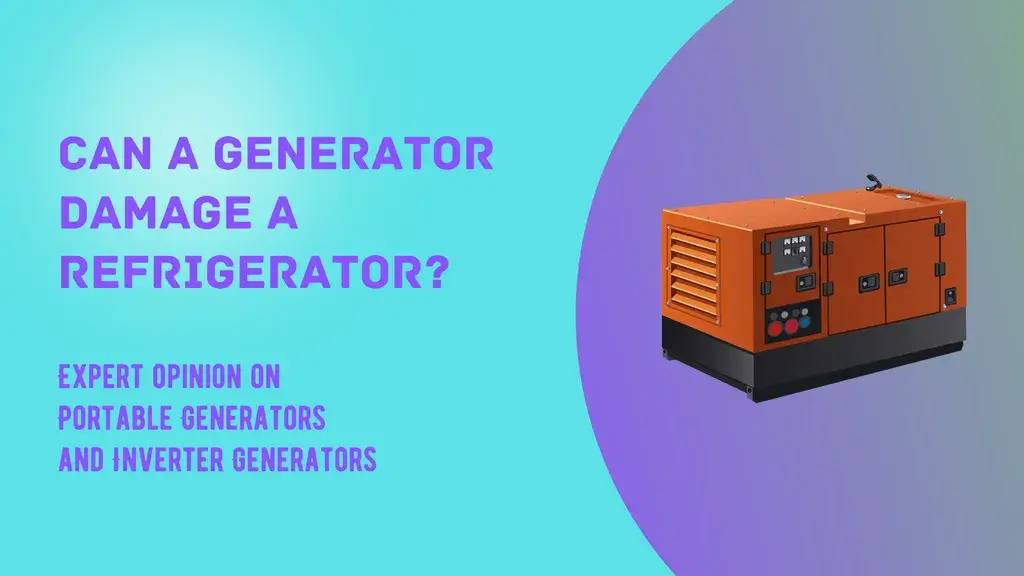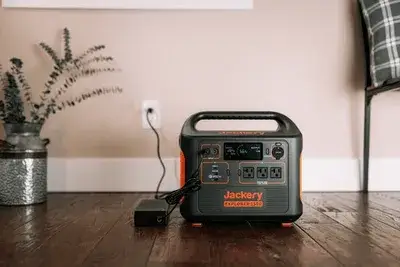Many people ask, “Can a Generator damage a Refrigerator?”. Let’s dig into it –
Every time there’s a power outage, our refrigerators stop running and start to lose cold air. Suppose the refrigerator door is opened in such a circumstance. In that case, warm air gets to go inside, mess up the food cooling process, and damage the refrigerator’s compressor eventually in the long run.
Most people consider running their refrigerators on a generator to ensure they function 24/7, even when the electricity goes off. Generators are great power tools that supply our refrigerators with constant electricity. Which prevents our food from rotting during a prolonged power outage, thus ensuring our peace of mind. You may also ask whether it is safe to run a refrigerator on a generator. We will discuss this in-depth in this article, so grab a seat and start reading!
Table Of Contents

Can a Generator damage a Refrigerator and other Kitchen Appliances?
The answer can be a yes and a no, both. Generators do have the potential to damage any electronic appliances, not just refrigerators alone, especially if power is surging through the electric circuits. But this is not a common scenario.
A generator is only likely to damage a refrigerator if the total power supply of the generator in watts is lower than your refrigerator’s power consumption in watts. Didn’t get it? Okay, let us give you an example then.
The minimum power required to run your refrigerator is around 800-1200 watts, depending on how latest the model is. If your generator has a maximum power supply capacity of 2000 watts, you can rest assured. There’s no way your refrigerator can get harmed by the generator.
However, here’s the catch – if you are running multiple appliances on the same generator, such as an air conditioner, microwave, a washing machine, etc. Then just 2000-3000 watts of power supply from your generator won’t suffice that case. We can give you an average value; if you want to run the whole house on a generator, it must have the ability to supply at least 7500 watts of electricity.
It’s better if you do the calculation yourself. Firstly, find out about the total power consumption of all your electronic appliances individually in watts (that you want to run on the generator). You can take help from the instruction manual guide of each appliance. If the total consumption value exceeds what your generator produces, you should be worried.
Now, we don’t mean to scare you. Cross-checking before connecting your refrigerator to a generator is the most straightforward hack to make sure you are on the safe side. As long as it can handle both the starting and operational wattages of the refrigerator, you are good to go. Otherwise, from our long-term experience, either one or the other appliance will get damaged in the long run.
Can a Portable Generator run a Refrigerator?
Frankly speaking, the portability of a generator does not determine whether it can run a refrigerator or not – the wattage/power supply does. So yes, a generator does run a refrigerator, whether it’s portable or not.
If we take a look at most modern households, all of them have a fridge and a freezer. An average-sized fridge-freezer needs a maximum of 1200 watts to start and a minimum of 800-900 watts to continuously run without any complications.

Hence, if you only wish to run refrigerators on your generator and nothing else, your portable generator needs to at least produce 2000 watts on average. However, if you want to run other electronic appliances simultaneously, go for a portable generator that can supply between 3500 – 4000 watts.
What if you have a chest freezer, too, along with your refrigerator? A regular-sized chest freezer of about 5 cubic feet will require 850 watts to kickstart and about a hundred watts to run. Based on our judgment, a 2000-watt portable generator will be sufficient.
Can an Inverter Generator run a Refrigerator?
Although it is more expensive than a typical one, an inverter generator happens to be more energy efficient as it inverts electricity. So, has it got what it takes to run a refrigerator?

Inverter generators convert DC battery power to AC household power of 120 volts, which allows them to efficiently run a refrigerator and any other electronic appliance. It’s essential to be aware of the power consumption of your refrigerator in amps or watts before you buy an inverter generator. We don’t know the size and model of your refrigerator, but most average households use a 16 cubic feet refrigerator.
So, let’s say your refrigerator needs 7 amps. If we convert it to watts, we are looking at 840 watts of power consumption for running effectively. If you’re thinking that a 1000-watt inverter generator will do, you are wrong, hun. For a refrigerator to start up, its motor will require a jolt of approximately thrice its running wattage. So, by multiplying 840 × 3, we get 2520 watts. Note that this jolt is not needed every day but only once, for a split second.
Based on the scenario above, you need an inverter generator that can supply around 850 watts continuously and can afford more than 2500 watts for the jolt. Another information to help you is that all inverter generators provide 2 different capacity values in the label stickers. One reads as CW – ‘Continuous Wattage’ and the other says PSW – which is the ‘Peak Surge Wattage. CW is basically what the inverter shall provide 24/7, and PSW accounts for the inverter’s ability to provide for the jolt.
Now you may ask, how many watts can a typical inverter generator supply? An average inverter generator suitable for a small household can provide around 1500 watts of CW power and approximately 3,000 watts of PSW power. Such an inverter generator model is definitely suited for efficiently running a typical 16-cubic-feet refrigerator.
Conclusion
Be it a portable generator or an inverter generator, both can sufficiently run a refrigerator if you choose the right one and the right size for each other. Don’t forget to do the calculations of total power consumption before you decide to run a refrigerator on a generator.
